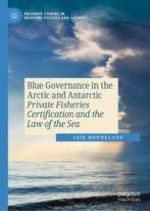2021 | OriginalPaper | Buchkapitel
4. MSC Certification of Antarctic and Arctic Fisheries
verfasst von : Geir Hønneland
Erschienen in: Blue Governance in the Arctic and Antarctic
Aktivieren Sie unsere intelligente Suche, um passende Fachinhalte oder Patente zu finden.
Wählen Sie Textabschnitte aus um mit Künstlicher Intelligenz passenden Patente zu finden. powered by
Markieren Sie Textabschnitte, um KI-gestützt weitere passende Inhalte zu finden. powered by
